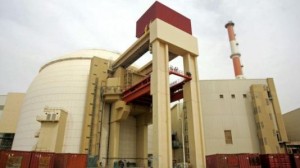 (Reuters) - The U.N. atomic watchdog is considering increasing its presence in�Iran�to better handle a bigger workload in verifying Tehran is implementing a landmark deal with world powers to curb its nuclear programme, diplomats said.
(Reuters) - The U.N. atomic watchdog is considering increasing its presence in�Iran�to better handle a bigger workload in verifying Tehran is implementing a landmark deal with world powers to curb its nuclear programme, diplomats said.Faced with an expanded role as a result of the November 24 accord, the International Atomic Energy Agency is likely to need more inspectors in Iran and is also examining whether to set up a small, temporary office there, they said.
While IAEA inspectors frequently travel to Iran to make sure there is no diversion of nuclear material for military purposes, they do not now have any such operational base.
It was unclear whether the U.N. agency had already raised the matter with Iran, which would need to approve it.
The extent of IAEA monitoring can be controversial in the Islamic Republic, which in the past has accused the Vienna-based watchdog of acting like a Western-manipulated intelligence agency and of leaking confidential information to adversaries seeking to sabotage its nuclear programme.
But relations have improved since the June election of a relative moderate, Hassan Rouhani, as Iranian president, paving the way for a diplomatic thaw with the West later in the year.
"I don't think it would be sensitive," a Western diplomat in the Austrian capital said. "It should be seen as a natural corollary to daily access. If staff are there every day they should be able to have an office."
The IAEA will see its work increase under the interim agreement between Iran and the six major powers because its inspectors will be the ones checking that Tehran lives up to its side of the six-month deal to halt sensitive nuclear work.
It says it is analysing what this will mean in terms of extra costs and manpower, but has not yet given details. It remains unclear when the implementation will start, but diplomats say the aim is later this month.
The IAEA has one to two teams of two inspectors each on the ground in Iran virtually every day of the year, staying in hotels, but that number is now set to increase.
"At least another team would be required to be there," another Vienna-based envoy said.
Diplomats accredited to the IAEA said some sort of office in Iran could help ease the administrative and logistical burden of carrying out more frequent inspections of Iran's enrichment sites of Natanz and Fordow and other facilities.
DAILY INSPECTIONS
This could, for example, reduce the time and money spent on travel to and from Iran and also facilitate the handling of specialised equipment. "It is to make it (the agency's activities) more effective," one of the diplomats said.
The IAEA declined to comment on the issue. Iran's mission to the IAEA was not immediately reachable.
Iran denies Western accusations that it has been seeking nuclear weapons capability, saying it is enriching uranium to fuel nuclear power plants. But the material can also provide the fissile core of an atomic bomb if processed further.
The U.N. agency's 35-nation governing board is expected to hold an extraordinary meeting in late January to discuss the IAEA's additional work under the agreement between Iran and the United States, France, Germany,�China, Russia and Britain.
Diplomats last month said the IAEA had tentatively assessed that it would cost roughly 5 million euros and that some of it would be covered by voluntary member state contributions.
Iran agreed to halt its most disputed nuclear activity - enrichment of uranium to a fissile purity of 20 percent - and cap other parts of its programme in return for a limited easing of sanctions that are damaging its oil-dependent economy.
To ensure that Iran is taking these steps, the IAEA will visit Natanz and Fordow on a daily basis compared with about once a week now. It will also inspect facilities where Iran is assembling the centrifuges used to refine uranium.
The diplomats stressed that any IAEA office in Iran would not be another regional office of the type it has in Tokyo and Toronto, but possibly along the lines of Rio de Janeiro, where its staff can work and store material in an office in a hotel.
"There could be some benefits of having a small IAEA office space in Iran," said former IAEA chief inspector Olli Heinonen, now at Harvard University's Belfer Center for Science and International Affairs.
"However, far more important is to have a robust and credible verification scheme to monitor the number of centrifuge rotors stocked and produced in Iran."
By Reuters
The Iran Project is not responsible for the content of quoted articles.










